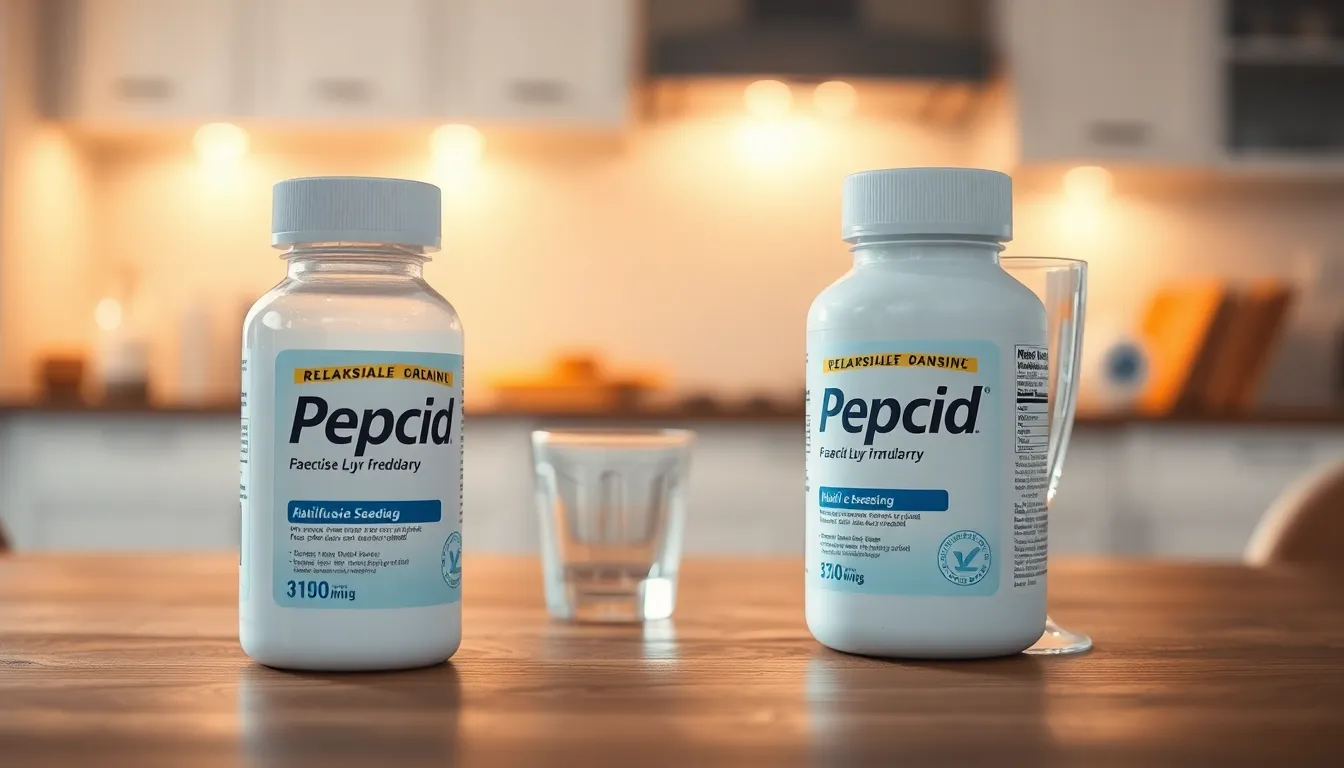Table of Contents
ToggleWhen heartburn strikes, many people reach for relief like a superhero in a cape. Pepcid and omeprazole are two popular choices in the battle against acid reflux, but can they team up for maximum effectiveness? Imagine the dynamic duo of your digestive system, ready to tackle that fiery discomfort.
Overview of Pepcid and Omeprazole
Pepcid contains famotidine, a histamine-2 blocker that decreases stomach acid production. Omeprazole, classified as a proton pump inhibitor, lowers acid secretion in the stomach. Both medications target acid-related conditions, such as heartburn and gastroesophageal reflux disease (GERD).
Efficient acid control is achieved when using either drug, though they function through different mechanisms. Pepcid works quickly, providing relief within an hour, while omeprazole takes longer, generally taking one to four days to reach full effectiveness.
Dosage varies based on the individual’s condition and response to treatment. Pepcid typically allows for dosing twice daily, while omeprazole is often administered once daily. Patients may notice differences in symptom relief based on personal health needs and medication choice.
Drug interactions can occur with combined use. Consulting a healthcare provider ensures safe recommendations tailored to unique circumstances. Both medications may provide symptom relief, but understanding their use together is vital.
Research shows that utilizing both medications may offer a dual approach to managing symptoms more effectively. However, careful consideration is necessary to avoid potential overmedication. Monitoring for side effects and overall effectiveness is essential during treatment.
Benefits of Pepcid

Pepcid provides several advantages for individuals experiencing acid-related conditions. This medication, containing famotidine, effectively reduces stomach acid production, offering quick relief from heartburn and discomfort.
Mechanism of Action
Pepcid acts as a histamine-2 receptor antagonist. By blocking histamine’s effects, it decreases the amount of acid produced in the stomach. This reduction occurs in a matter of hours, allowing for rapid symptom relief. Pepcid’s action focuses specifically on the stomach’s acid production apparatus, making it effective for acute episodes of heartburn and gastroesophageal reflux.
Common Uses
Pepcid is commonly recommended for treating conditions such as heartburn, acid indigestion, and gastroesophageal reflux disease (GERD). Healthcare providers often prescribe this medication for those seeking immediate relief from painful symptoms. It may also serve as a preventative measure for individuals expecting to experience acid-related discomfort, especially before consuming certain foods or beverages known to trigger heartburn.
Benefits of Omeprazole
Omeprazole offers significant advantages for individuals experiencing acid-related conditions. This medication stands out because of its effectiveness in reducing stomach acid production.
Mechanism of Action
Omeprazole functions as a proton pump inhibitor. By blocking the proton pumps in the stomach lining, it significantly decreases acid secretion. Reduction in acid levels leads to relief from various gastrointestinal issues. As it’s absorbed into the bloodstream, omeprazole works to prevent acid production over time, providing a long-lasting effect compared to other medications.
Common Uses
Omeprazole is widely utilized for managing gastroesophageal reflux disease (GERD) and chronic heartburn. Many healthcare providers prescribe this medication for treating stomach ulcers and preventing their recurrence. This drug proves beneficial for patients experiencing esophagitis due to acid reflux. Individuals might also use omeprazole as a preventative measure for those at risk of acid-related disorders, especially during treatment with nonsteroidal anti-inflammatory drugs (NSAIDs).
Possible Interactions
Understanding interactions between Pepcid and omeprazole is crucial for effective heartburn management. Both medications can reduce stomach acid, but their combined use requires caution.
Research Findings
Studies suggest that combining Pepcid and omeprazole may enhance acid control in patients with severe gastroesophageal reflux disease (GERD). A clinical trial indicated that patients taking both medications experienced greater symptom relief compared to those on single therapy. Other research pointed out the potential for increased efficacy in managing nighttime heartburn symptoms. Side effects of this combination remain unclear, so ongoing monitoring is essential.
Professional Guidelines
Healthcare providers often recommend careful evaluation before prescribing Pepcid and omeprazole together. Various clinical guidelines emphasize the importance of assessing individual patient factors. Recommendations may vary based on health conditions and medication history. Regular follow-ups play a vital role in ensuring therapeutic effectiveness while minimizing adverse effects. Experts advise using this combination only when necessary, maintaining awareness of possible interactions with other medications.
Recommendations for Combining Medications
Consult a healthcare provider before combining Pepcid and omeprazole. Medical professionals evaluate individual health needs and potential drug interactions. Monitoring is crucial when taking both medications, as each reduces stomach acid.
Observe for side effects while using these medications together. Some studies show that this combination offers improved symptom relief in severe GERD cases. Evaluate how patients respond to the joint treatment over time.
Consider adjusting dosages based on individual tolerance and effectiveness. Pepcid’s quick relief complements omeprazole’s long-lasting effects, making them a potentially effective team. Review symptoms regularly to ensure both medications remain beneficial.
Follow professional guidelines to maintain safety during treatment. Healthcare providers should assess each patient’s unique medication history. Regular follow-ups ensure that both medications continue to provide the desired therapeutic effects, minimizing risks associated with overmedication.
Pepcid and omeprazole can potentially complement each other in managing heartburn and acid-related conditions. Their unique mechanisms of action may provide enhanced symptom relief for those struggling with severe GERD. However, it’s crucial to approach this combination with caution.
Regular consultations with a healthcare provider are essential to tailor treatment plans based on individual health needs. Monitoring for side effects and adjusting dosages ensures the combination remains effective and safe. By working closely with a medical professional, individuals can make informed decisions about their treatment and achieve better control over their symptoms.







